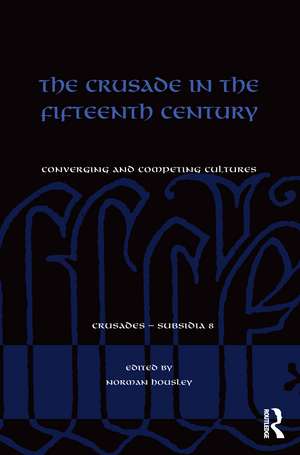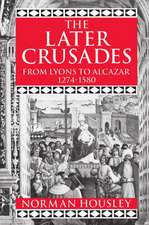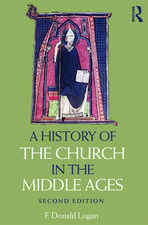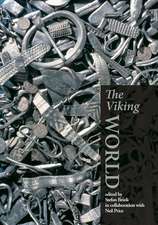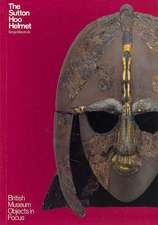The Crusade in the Fifteenth Century: Converging and competing cultures: Crusades - Subsidia
Editat de Norman Housleyen Limba Engleză Hardback – 13 iun 2016
Din seria Crusades - Subsidia
- 16%
 Preț: 338.33 lei
Preț: 338.33 lei -
 Preț: 401.92 lei
Preț: 401.92 lei -
 Preț: 310.66 lei
Preț: 310.66 lei -
 Preț: 469.34 lei
Preț: 469.34 lei - 26%
 Preț: 324.16 lei
Preț: 324.16 lei - 16%
 Preț: 338.33 lei
Preț: 338.33 lei -
 Preț: 469.34 lei
Preț: 469.34 lei - 16%
 Preț: 338.33 lei
Preț: 338.33 lei -
 Preț: 386.13 lei
Preț: 386.13 lei - 16%
 Preț: 262.14 lei
Preț: 262.14 lei - 19%
 Preț: 265.60 lei
Preț: 265.60 lei -
 Preț: 388.64 lei
Preț: 388.64 lei - 16%
 Preț: 264.98 lei
Preț: 264.98 lei - 19%
 Preț: 265.51 lei
Preț: 265.51 lei -
 Preț: 371.72 lei
Preț: 371.72 lei - 18%
 Preț: 899.75 lei
Preț: 899.75 lei - 18%
 Preț: 1002.26 lei
Preț: 1002.26 lei -
 Preț: 312.09 lei
Preț: 312.09 lei
Preț: 1055.51 lei
Preț vechi: 1287.22 lei
-18% Nou
Puncte Express: 1583
Preț estimativ în valută:
201.97€ • 220.08$ • 170.19£
201.97€ • 220.08$ • 170.19£
Carte tipărită la comandă
Livrare economică 23 aprilie-07 mai
Preluare comenzi: 021 569.72.76
Specificații
ISBN-13: 9781472464712
ISBN-10: 1472464710
Pagini: 238
Ilustrații: 18
Dimensiuni: 156 x 234 x 18 mm
Greutate: 0.48 kg
Ediția:1
Editura: Taylor & Francis
Colecția Routledge
Seria Crusades - Subsidia
Locul publicării:Oxford, United Kingdom
ISBN-10: 1472464710
Pagini: 238
Ilustrații: 18
Dimensiuni: 156 x 234 x 18 mm
Greutate: 0.48 kg
Ediția:1
Editura: Taylor & Francis
Colecția Routledge
Seria Crusades - Subsidia
Locul publicării:Oxford, United Kingdom
Cuprins
Contents
List of figures and maps
List of abbreviations
Notes on contributors
Maps
Preface
1 Introduction
Norman Housley
Conquerors and conquered
2 Crusading in the fifteenth century and its relation to the development of Ottoman dynastic legitimacy, self-image, and the Ottoman consolidation of authority
Nikolay Antov
3 Byzantine refugees as crusade propagandists: the travels of Nicholas Agallon
Jonathan Harris
The crusading response: expressions, dynamics and constraints
4 Dances, dragons and a pagan queen: Sigismund of Luxemburg and the publicizing of the Ottoman Turkish threat
Mark Whelan
5 Alfonso V and the anti-Turkish crusade
Mark Aloisio
6 Papal legates and crusading activity in central Europe: the Hussites and the Ottoman Turks
Antonin Kalous
7 Switching the tracks: Baltic crusades against Russia in the fifteenth century
Anti Selart
Diplomatic and cultural interactions
8 Tīmūr and the ‘Frankish’ powers
Michele Bernardini
9 Venetian attempts at forging an alliance with Persia and the crusade in the fifteenth and early-sixteenth centuries
Giorgio Rota
10 Quattrocento Genoa and the legacies of crusading
Steven Epstein
Frontier zones: the Balkans and the Adriatic
11 The key to the gate of Christendom? The strategic importance of Bosnia in the struggle against the Ottomans
Emir Filippović
12 Between two worlds or a world of its own? The eastern Adriatic in the fifteenth century
Oliver Jens Schmitt
13 The Romanian concept of crusade in the fifteenth century
Sergiu Iosipescu
14 Conclusion: transformations of crusading in the long fifteenth century
Alan V. Murray
Index
List of figures and maps
List of abbreviations
Notes on contributors
Maps
Preface
1 Introduction
Norman Housley
Conquerors and conquered
2 Crusading in the fifteenth century and its relation to the development of Ottoman dynastic legitimacy, self-image, and the Ottoman consolidation of authority
Nikolay Antov
3 Byzantine refugees as crusade propagandists: the travels of Nicholas Agallon
Jonathan Harris
The crusading response: expressions, dynamics and constraints
4 Dances, dragons and a pagan queen: Sigismund of Luxemburg and the publicizing of the Ottoman Turkish threat
Mark Whelan
5 Alfonso V and the anti-Turkish crusade
Mark Aloisio
6 Papal legates and crusading activity in central Europe: the Hussites and the Ottoman Turks
Antonin Kalous
7 Switching the tracks: Baltic crusades against Russia in the fifteenth century
Anti Selart
Diplomatic and cultural interactions
8 Tīmūr and the ‘Frankish’ powers
Michele Bernardini
9 Venetian attempts at forging an alliance with Persia and the crusade in the fifteenth and early-sixteenth centuries
Giorgio Rota
10 Quattrocento Genoa and the legacies of crusading
Steven Epstein
Frontier zones: the Balkans and the Adriatic
11 The key to the gate of Christendom? The strategic importance of Bosnia in the struggle against the Ottomans
Emir Filippović
12 Between two worlds or a world of its own? The eastern Adriatic in the fifteenth century
Oliver Jens Schmitt
13 The Romanian concept of crusade in the fifteenth century
Sergiu Iosipescu
14 Conclusion: transformations of crusading in the long fifteenth century
Alan V. Murray
Index
Notă biografică
Norman Housley is Professor of History at the University of Leicester, UK.
Descriere
Increasingly, historians acknowledge the significance of crusading activity in the fifteenth century, and they have started to explore the different ways in which it shaped contemporary European society. Just as important, however, was the range of interactions which took place between the three faith communities which were most affected by crusade, namely the Catholic and Orthodox worlds, and the adherents of Islam. Discussion of these interactions forms the theme of this book. Viewed overall, this collection of essays makes a powerful contribution to breaking down the old and discredited view of monolithic and mutually exclusive "fortresses of faith".
